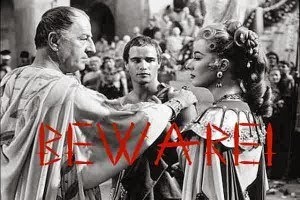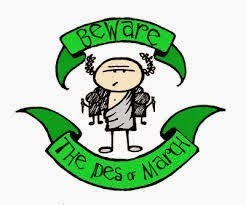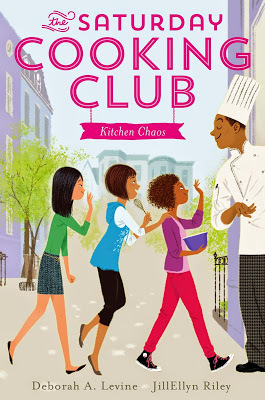Marcia Thornton Jones's Blog, page 177
March 2, 2015
Beware the ides of March by Ann Haywood Leal

Beware!
Watch out!
Heed my warning!
We can always exercise a little caution in our lives. But can we be too cautious as writers?
Sometimes we need to ignore the caution flag and step out of our comfort zones.
I'd be willing to bet that you have at least one idea that's been lurking around in a back out-of-the-way mind cavern. It may have been stashed away eons ago, because it's a little out of the ordinary or too away from the mainstream. Maybe someone tried to convince you that nobody was buying/reading (blank) right now.
Ignore the soothsayer's warning and uncover that idea. Peel off the layers and let it grow into a story. It's hung around for so long for a reason, don't you think?

March 1, 2015
SMACK DAB NEWS
Tamera Will Wissinger's novel in verse, GONE CAMPING, is scheduled to arrive in 2017 from Houghton Mifflin Harcourt Books for Young Readers. In this companion to GONE FISHING: A Novel in Verse, the poems tell the story of Sam and Lucy's camping adventure and how Lucy handles her fear of sleeping outside and away from home.
* * * * * * * * * * * * * * * * * * * * * * *
February 28, 2015
PATH - a Four Letter Word by Tracy Holczer
BUT, the path leading up to the moment I pressed send on my first ever query letter was anything but a breeze.
I joined SCBWI in 2002. I slaved over a book for five or so years that I recognized wasn't good enough. I took classes and workshops and spent a fortune on craft books as well as read, what felt like, every book in my library. Then I got Grace in my brain one Sunday afternoon and wrote the first fifteen pages. I submitted for the manuscript critique at the SCBWI Summer Conference in 2007 and was quite shocked when a couple of months later, Steve Mooser called with the good news that I'd won the Sue Alexander Award. I went to New York for the winter conference, met with some editors, and went back to my novel feeling ready to conquer the world.
Which is precisely NOT what happened.
I may have figured out how to write a novel. But I hadn't yet figured out how to write a GOOD novel. Like Ira Glass says (see full video - SO WORTH IT), but to paraphrase:
"Nobody tells this to people who are beginners, I wish someone told me. All of us who do creative work, we get into it because we have good taste. But there is this gap. For the first couple years you make stuff, it’s just not that good. It’s trying to be good, it has potential, but it’s not. But your taste, the thing that got you into the game, is still killer. And your taste is why your work disappoints you. A lot of people never get past this phase, they quit. Most people I know who do interesting, creative work went through years of this. We know our work doesn’t have this special thing that we want it to have. We all go through this. And if you are just starting out or you are still in this phase, you gotta know its normal and the most important thing you can do is do a lot of work."
It took me three more years to write THE SECRET HUM OF A DAISY. I probably wrote eight thousand drafts, seven thousand ninety-nine of them weren't good enough. But number eight thousand? That one was good enough. I finally felt like it had that "special something."
I have no doubt that if I'd queried those seven thousand ninety-nine drafts, I would have been rejected countless times. Perhaps I would have given up. I'm so glad I'll never know.
STICK WITH IT!!!
February 26, 2015
Guest Post: Our Journey To Publication by JillEllyn Riley and Deb Levine
I'm delighted to welcome Deb Levine and JillEllyn Riley to Smack Dab today! Their journey to publication of their co-authored SATURDAY COOKING CLUB: KITCHEN CHAOS is a lot like the story itself -- full of food, friendship, fun, and more:
Can their friendships take the heat? A trio of mothers and daughters will find out when they sign up for a cooking class from a famous chef in the first book of the Saturday Cooking Club series—it’s mother-daughter bonding and so much more!Liza and Frankie have always been best friends. But when new girl Lillian arrives from San Francisco, suddenly three’s a crowd. Especially after the trio is grouped together for a big sixth-grade social studies project—can they put aside their animosity long enough to succeed? When Liza suggests they all take a cooking class with the chef from her favorite cooking show for the project, the girls are on board, but they need an adult to take the class with them. It seems like the perfect opportunity to snag some quality time with their overscheduled, overstressed mothers…if they can convince them to sign up!
Several headaches and close calls later, the girls at last find themselves in Chef Antonio’s kitchen with their mothers in tow—but the drama is only just beginning!"
JillEllyn:
Our journey to publication began--literally--on a quiet brownstone block in Carroll Gardens, Brooklyn. Quiet might not be accurate actually. The block is disappointingly staid--underwhelming for Halloween trick-or-treating, for instance--but we met casually over the din of a whole gaggle of small children and toddlers, our own and other friends'. Bumping into each other sporadically in the neighborhood, as kids climbed over decorative iron railings or swung upside down from scaffolding, we realized that we both worked in media/publishing. We started to consult about our separate creative projects and discovered that we loved working together. We talk a lot, we laugh a lot, and we edit and revise each other's writing with ease, comfort, and very little ego. Then we had the idea of three girls in Brooklyn who long to make changes in themselves, their lives, and their families. Since most kids love to sift; stir; mix; concoct their own delicacies--and cooking shows are tremendously popular with kids--it seemed like an appealing way to watch our characters start to mold their lives. Taking inspiration from girls we knew, girls we once were, mothers we became, and the rich and varied population of Brooklyn--especially the incredible food options and traditions that abound--we dreamed up our three girls and their lives...
Deb:
Since we both adore middle-grade books and their readers, it seemed natural that we'd write a middle-grade book ourselves. As moms of middle schoolers--and former tweens--we thought the pushing-away/pulling-closer dynamic between pre-teen girls and their mothers would add another layer to our characters' story. It didn't take long before we landed on the idea of a mother-daughter cooking class--and once we did, we realized we didn't have to contain our story in a single book. Envisioning The Saturday Cooking Club as a series rather than one novel helped us develop detailed character arcs for each of the girls, and a narrative thread between each book in the series.
After we'd plotted out the series, we had to figure out how we'd actually do the writing of the books as a team. I don't remember which one of us came up with the idea of alternating chapters in the voices of each of the three girls, but we decided in the very beginning that doing so would truly bring their unique personalities and perspectives to life for our readers. Narrating the book in three different voices also made it easier for us as co-authors to divide and conquer the chapters. And when we finally finished off the last chapter and clicked save, we discovered how close to our characters we'd become, and how much we were going to miss them when we weren't inside their three very different heads every day.
*Spoiler alert* the next book in the series, which will be published later this year, is written primarily in one character's voice, but the other girls definitely still have their say throughout the book.
February 25, 2015
THE NEXT STEP OF THE JOURNEY (HOLLY SCHINDLER)
The thing is, though, the "path to publication" doesn't end with the first yes.
At this point in my career, I think of "path to publication" not as I did in the beginning--as my name at the bottom of a contract. I think of it as figuring out what your own successful niche is as a writer. What gives you the most satisfaction, allows you to put out work at the right pace, makes you the amount of money you need to exist?
I'll admit, I'm still figuring it out. I've pubbed with a small house and two of the "Big Five." I've published in multiple genres for multiple age groups. Within the next few weeks, I'll start branching out into independent publishing. The first release will be a New Adult rom-com (another new age group and genre).
The thing is, getting a "yes" from the publishing world is an important step...But now, I'm asking myself, "What makes ME say yes?" That is, where do I most happily intersect with my readers? Where does my career most happily intersect with the rest of my life--allowing for room to explore within the industry AND room to breathe?
Jury's still out...But I'm anxious to find out what I learn on the next step of the journey...
February 23, 2015
A Long and Winding Road: Feb. Post Jen Cervantes
 I didn’t set out to write a novel, (I’d never written a word of fiction). And then my youngest daughter, Juliana asked me to write her a story. I picked up a pen and something magical happened! Call it a coincidence, call it a God wink, call it destiny. After, joining a critique group and editing over and over, I sent out queries to agents and signed with my first agent. Within a year she’d sold the ms.
I didn’t set out to write a novel, (I’d never written a word of fiction). And then my youngest daughter, Juliana asked me to write her a story. I picked up a pen and something magical happened! Call it a coincidence, call it a God wink, call it destiny. After, joining a critique group and editing over and over, I sent out queries to agents and signed with my first agent. Within a year she’d sold the ms. Tortilla Sun won awards, made school lists, and was met with wonderful reviews. It has gone into several printings, including a paperback edition. After five years, it is STILL selling strong.
Since my first novel I’ve signed with another agent and have been out on sub three times. Each time has been met with CLOSE calls. I’ve had projects go to sales and acquisitions only to be rejected.
I have no idea why the timeframe seems to be longer for this next project. I’ve stopped worrying about it. My focus is on the work at hand and writing what I love.
I received a letter a couple of weeks ago from a fourth grader. she wrote, "Please please please keep writing and make sure the next book is as good as the first.” I smiled, thinking I couldn’t agree more.
Smack Dab in the Classroom by Dia Calhoun: Better Author Reports.
If the author were lying in a hammock, what would she daydream about?If the author could take a trip anywhere in the world (or universe) where would she go and why?If the author could choose between waltzing in a glittering ballroom, or riding a horse through the hills, which would he choose and why?What do you think the author's favorite childhood book was, and why?If you could do one thing with the author what would it be, and why?If the author could only hang one object on the wall of his house, what would it be and why?You get the idea. How I would have loved to have answered questions like those, questions that engaged me imaginatively with the author. And how I would love to answer such questions, now, as an author myself.
Happy Imagining!
February 22, 2015
My Circuitous Path to Publication by Laurie Calkhoven
I stayed for twenty years. All the while I vaguely thought I would write “one day.” I read all the time; I collected books about writing; I didn’t write. With forty looming, I realized I was going to have to make one day happen. A friend pointed me to yet another book—Julia Cameron’s The Artist’s Way. And I started writing what she calls morning pages—three pages a day, first thing in the morning, every day. Months later I discovered I was a children’s writer, not the next Anne Tyler or Margaret Atwood. That was a surprise, but one I embraced.
In the next year and a half I changed my career from adult to children’s publishing, took a couple of classes, joined a critiqued group, and started shopping around my first novel. It made it to the acquisitions committee at four different houses. Each time there was a long, agonizing wait and eventually a rejection. Still I began to build a network of editors who were interested in my work and that led to an opportunity to write for a series. I left my job and began my freelance career writing nonfiction, media tie-ins, and “other people’s books.” I learned a lot and continued to work on my craft and my own books when I could squeeze them in.
 Then I ran into one of the editors who tried to buy my first novel at an SCBWI conference, and he asked the magic question: “What are you working on?” I was about to tell him about my current TV tie-in novel when I realized this was an opportunity. Writing one of those many series books, a biography of George Washington, I had gotten an idea for a novel about a young spy in the early days of the American Revolution. I shared my idea and pretended to be farther along than I was.
Then I ran into one of the editors who tried to buy my first novel at an SCBWI conference, and he asked the magic question: “What are you working on?” I was about to tell him about my current TV tie-in novel when I realized this was an opportunity. Writing one of those many series books, a biography of George Washington, I had gotten an idea for a novel about a young spy in the early days of the American Revolution. I shared my idea and pretended to be farther along than I was.He was interested. In fact, he said he’d be even more interested if I turned it into a series, featuring American boys in different wars. I threw together a proposal. It was in front of the acquisitions committee within a week, and I got an offer the next day. It all happened so fast my head was spinning. After twenty-five books, my novel was being published.
I continue to write other people’s books. Few have my name on them. Some have been bestsellers; others have gotten starred reviews. None of them have made me happier than holding that first Boys of Wartime novel in my hands.
February 19, 2015
My Path to Publication (February Theme) by Kristin Levine
Dear Ms. Green:
My name is Kristin Levine and I am seeking representation for my children's novel. Moundville is a middle-grade novel of approximately 40,000 words, loosely based on my grandfather's memoirs.
Now before you delete this message, thinking uggh, not another "memoir-based novel," originally I didn't want to read those memoirs either. I, a white woman living outside Washington, DC, assumed that because my grandfather spent his childhood in Alabama, he was racist. Boy was I wrong!
When I finally broke down and read his unpublished writings, I discovered my grandfather had had black friends. Racial tensions certainly existed, but relationships in his small town weren't as clear-cut as I had assumed. In addition, he described a freedom to go wherever and do whatever he wanted as a child, a freedom that is lost to children growing up today. From this setting and atmosphere flowed the invented story of a friendship between a poor, white boy and an educated, black girl in 1918 rural Alabama.
Although Moundville is the first novel I'm attempting to publish (I've got another unpublished manuscript on a back shelf where it belongs), I'm not a beginning writer. A former elementary school teacher and avid children's book reader, I have taught screenwriting at American University for three years. I have directed two independent films (a feature and a documentary) and have written a number of screenplays, which have received recognition from organizations including AFI, Nicholl Fellowships in Screenwriting, Slamdance, and the Academy of Television Arts and Sciences. Moundvilleactually began as a screenplay, until I realized the story was much better suited to the novel format.
I have included my contact information and a brief summary below. If you would be interested in reading Moundville, I would be happy to send you a hard copy. Thank you for your consideration.
Sincerely,
Kristin Levine
Moundville Summary:
I ain't gonna tell you this story. No sir. No way. I got a million better things to do than think about that dumb old stuck-up girl and all the trouble she caused. Everything was just fine in Moundville, 'til Emma Walker came to town.
My real name is Harry Otis Sims, but everybody calls me Dit. It was the summer of 1918 when she moved to Alabama, daughter of the postmaster, smart and black. 'Course I wanted to nothing to do with her. And I ain't gonna tell you how she tricked me into becoming friends with her. No sir. Not gonna tell you how she caught me breaking the teacher's window, shooting a buzzard, and trying to drown some kittens.
I admit, when our town's barber was accused of murder, she was the one that came up with the plan to get him off. But I helped. I did most of the work. And don't let nobody tell you it was my fault he got in a fight with the sheriff in the first place. 'Cause it wasn't. No sir. 'Cept if I'm being real honest, maybe it was - just a little.
And don't you believe a word of it if anyone tells you I cried when she left. 'Cause I didn't. No way. Not even a little. 'Course, I have been known to lie now and then. Emma said it was one of my worst traits, but I think she kind of liked how I could spin a good yarn. Still I ain't gonna tell you this story. 'Less you ask real real nice, and then, well, maybe I will.
February 18, 2015
Writing My Own Rejection Letter (February theme) by Claudia Mills
Except that I can't master how to type editorial letters on my IBM Selectrix typewriter, making that little sandwich of letterhead, carbon paper, and second sheet so that the copy doesn't come out on the BACK of the original. And I can't figure out how to transfer phone calls. And the bus commute each from Princeton to NYC is so long, a good 90 minutes each way.
But on the bus ride I sit with my clipboard, pad, and pen writing picture books (they're so easy, right?). I start submitting them to publishers. They all come back rejected: standard form letter, no feedback, no clue re what I'm doing wrong - even my masterpiece, Campbell the Tomato, starring a stuffed toy tomato who is ostracized by the other stuffed animals until he rolls across a nursery fire ("Stop, drop, roll") to put it out, save the day, and become a hero. Why on earth would any editor reject THAT?
I say to myself, "If only I could be there in a publishing office to hear what editors are saying about Campbell. If only I could eavesdrop, invisible, to learn more...."
That's when I have my brilliant idea of submitting Campbell the Tomato to Four Winds Press under a pseudonym. I could be sitting there at my desk, typing, filing, answering the phone, ready at hand to hear the editor's shriek of delight when she races out of her office: "I've found the book I've been waiting for, for twenty years! I will be known forever as the editor who discovered Campbell the Tomato!"
Alas, Campbell was rejected, yet again.
And I was the one who had to type the rejection letter.
I sent in a second pseudonymous story. I typed myself a second rejection letter.
Then I sent in a third. This time my boss, Barbara Lalicki, came out of her office with my story, handed it to me, and asked me to write her an editorial critique.
What did I think of my own story?! Well, for starters, I thought it was amazing, astonishing, and sure to sell a million copies. I rolled a piece of paper into my typewriter and readied myself to write the critique. But then I read my story over again, as if a stranger had written it. For the first time I saw flaws I had never seen before. A picture book, this wasn't. It was too long, too old, too dark. The ending didn't work. But what if it were developed into a full-length novel? So I wrote Barbara a balanced and objective critique, highlighting both strengths and weaknesses. Barbara sent the critique by her editorial secretary (me) to the author (me), with a letter (typed by me), saying that if the manuscript was revised according to these suggestions, she'd like to see it again.
That was the manuscript that became my book At the Back of the Woods. Of course I had to tell Barbara who I was. Luckily for me, she has a good sense of humor. This was my path to publication.
Few people are going to get their work published in this way. But I think I can distill some more general nuggets of advice from it.
1) Know your market. From working in the industry, I learned a lot about what gets published and what doesn't, and why. That made me more able to critique my own work. A good substitute here is to go your local bookstore or public library and read as much good new work as you can. Talk to your bookseller and librarian about what they think works, doesn't work, and why.
2) Be prepared to re-conceive your initial conception of a project considerably. In my case, a picture book became a middle-grade novel.
3) Be prepared to put some projects away forever in a carton in your attic or garage. Campbell the Tomato is still there in mine.
4) Keep writing new work as you wait to hear the fate of old work. Even after Four Winds Press accepted my first book, and a second one, they rejected my next four manuscripts in a row.
5) Don't take rejection too personally. Everyone gets rejected. Just be glad you don't have to be the one rejecting yourself!




